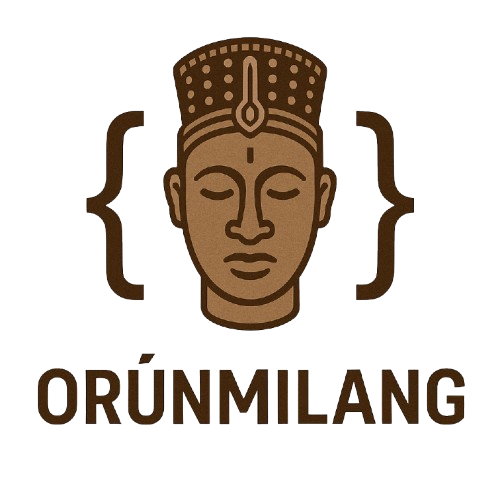OrunmilangOrunmilang is a minimal, beginner-friendly programming language inspired by the syntax and linguistic structure of Yoruba, a major African language spoken by millions in Nigeria 🇳🇬, Benin 🇧🇯, Togo 🇹🇬, and parts of Ghana 🇬🇭, Ivory Coast 🇨🇮, Sierra Leone 🇸🇱, and The Gambia 🇬🇲. Designed to teach programming fundamentals through culturally relevant constructs, Orunmilang bridges the gap between technology and indigenous knowledge systems. The name Orunmilang derives from Yoruba words: òrúnmìlà (the deity of wisdom and divination in Yoruba spirituality) and ọ̀rọ̀ (word or language), symbolizing a "language of wisdom." This reflects its mission to empower learners by making coding intuitive and culturally resonant. Orunmilang was created as part of a master’s coursework project in Open Source Software at Nankai University, China, in 2025. It aims to democratize programming education by offering a tool that resonates with African and diasporic learners while being accessible to anyone interested in culturally inspired computing. In a world where technology often reflects Western paradigms, Orunmilang promotes diversity in tech by embedding Yoruba linguistic patterns, such as verb-object structures and tonal expressiveness, into its syntax. This makes it a powerful educational tool and a potential domain-specific language (DSL) for cultural computing, fostering inclusivity and representation in the global tech landscape. 🌍 Vision & RoadmapOrunmilang aims to make programming inclusive by blending coding with Yoruba linguistic structures. It serves as an educational tool and potential domain-specific language (DSL) for cultural computing. Future goals include expanding the type system, adding data structures, and deepening cultural relevance. Short-term Goals:
Long-term Vision:
🧩 Orunmilang for VS CodeTo enhance your development experience, Orunmilang is now available as a Visual Studio Code extension! This extension provides:
🔧 Extension InstallationOption 1: Marketplace Installation
Option 2: Manual Installation via
|
| Feature | Status | Notes |
|---|---|---|
| Arrays/Objects | ❌ Not supported | Support for lists and objects is planned for future versions |
| Static Typing | ❌ Runtime only | No compile-time type checking; types are checked at runtime |
| Standard Library | ❌ Minimal built-ins | Very limited functions available; more will be added |
| Multi-line Comments | ❌ Single-line only | Only // single-line comments supported for now |
🛠️ Installation
git clone https://github.com/Lanlokun/orunmilang.git
cd orunmilang
npm install
npm link
npm run build
🚀 Usage
orunmilang example.orun
🤝 Contributing
Contributions are welcome! To contribute:
- Fork the repository.
- Create a branch: git checkout -b feature/your-feature.
- Commit changes: git commit -m "Add your feature".
- Push to the branch: git push origin feature/your-feature.
- Open a pull request.
📜 Code of Conduct
We are committed to fostering an inclusive community. Please adhere to the Contributor Covenant Code of Conduct. Report unacceptable behavior to mlanlokun@gmail.com.
📈 Project Status
Orunmilang is in active development, with core features (arithmetic, conditionals, loops, functions) stable. It’s suitable for educational use but lacks advanced features like arrays or a standard library. Contributions to address limitations are encouraged.
🧑🏽💻 Author
Crafted with love by Malik Kolawole Lanlokun. Reach out via GitHub to collaborate or share ideas.
📄 License
This project is licensed under the MIT License - see the LICENSE file for details.




